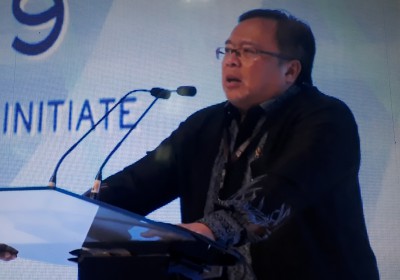IDF 2019: Competitive Human Resources, the Key for Structural Transformation towards becoming a Developed Indonesia
July 23, 2019
Minister of National Development Planning / Head of National Development Planning Agency (Minister of PPN/Bappenas), Bambang Brodjonegoro.
Regulations, low institutional quality, lack of sufficient infrastructure, fiscal policy, and human resources that are not competitive are some of the issues that can hinder economic growth in Indonesia. Therefore, structural transformation becomes the key, particularly by utilising demographic bonus, to continue to boost the nation’s economic growth, which can ultimately change its economic status from a developing to a developed country.
Accelerating structural transformation is one of the subthemes discussed on the Indonesia Development Forum (IDF) 2019, which this year highlights the main topic of “Mission Possible: Seizing the Opportunities for Future Work to Drive Inclusive Growth.” This topic is important considering that structural transformation is closely related to changing the state’s economic structure; from agrarian to industrial-based, and then to service-based.
Even though Indonesia’s economic growth is said to have progressed consistently in the last 20 years, economic structural change has actually been moving slow and not according to plan. The industrial sector has yet to absorb the number of workers suitable for their needs. Also, many of Indonesia’s workforce is still working in the service sector, but informally, thus does not generate adequate income for them.
In his presentation on the Main Plenary session entitled “Structural Transformation” on the first day of IDF 2019, the Minister of National Development Planning / Head of National Development Planning Agency (Minister of PPN/Bappenas), Bambang Brodjonegoro, conveyed that “Indonesia 2045” envisages that upon reaching 100 years, Indonesia has successfully become a high-income country.
This can only be realised if the average economic growth can be consistently sustained at around 5.1 to 7 per cent. According to Bambang, during recent years, Indonesia has been heavily relying on commodities and natural resources, which will be difficult to be depended on to provide a contribution for higher growth.
Therefore, Bappenas has prepared three economic development scenarios, namely by focusing on industrial revitalisation to make manufacturing sector consistently grow above economic growth; transforming the service sector, particularly in the tourism sector; and improving the productivity of primary sectors, such as agriculture and fisheries.
“To achieve high growth, Indonesia must revert back to the manufacturing sector,” said Bambang.
To break down the opportunities in Industrial Revolution 4.0, the Minister of Industry, Airlangga Hartarto, mentioned five priority sectors in Making Indonesia 4.0., namely food and beverages, textile, automotive, electronic, and chemical industries. To optimise the economic potential on these priority sectors, policies for 2020-2024 will be directed towards improving the productivity and competitiveness of export manufacturing goods and strengthening strategic upstream industries.
Another policy considered to be able to drive the acceleration of structural transformation is by providing a tax incentive to promote vocational development in Indonesia. The goal is so that Indonesia can continue to develop competent human resources.
IDF 2019 has a unique edge of convening various parties from the government, scholars, and smart practice actors. Economic and Carl Marks Professor from Cornell University, Kaushik Basu, argues the importance of a radical policy change for education in Indonesia. Investment in education must be geared towards creative, innovative, and research-based education. This is because technical and mechanical education has been replaced by technology.
“I am very optimistic about Indonesia’s economy. Indonesia has survived the various major economic crisis, namely in 1998 and 2008, but can always rise up and sustain its economic growth of 5.2 per cent. Other countries are also optimistic about Indonesia’s economy. Going forward, its economy can grow even further, even to 7 per cent per year,” said Kaushik.
IDF emphasised on researches, smart practices, and learnings from the experience of developing at the grass-root, all the way to the national and international level. By using a discussion-like approach and inviting a myriad of experienced resource persons, IDF is expected to support Indonesia to continue to pursue competitiveness, while obtaining relevant ideas as a basis to develop a road map and policies on future employment opportunities in Indonesia. Let’s get ready to explore future inclusive opportunities on the second day of IDF 2019!
Indonesia’s Research Institutions Supporting the Development of the Electric Vehicle Industry
Indonesian Muslim Fashion and Cosmetics IKMs Shine at Dubai World Expo 2020
Govt Steps Up UMKM Transformation Efforts in the Midst of Pandemic Slowdown
Govt Encourages Promotion of IKM Products in Digital Era
Government Begins Developing Maritime Training Center in Makassar
Tweets by IDDevForum
